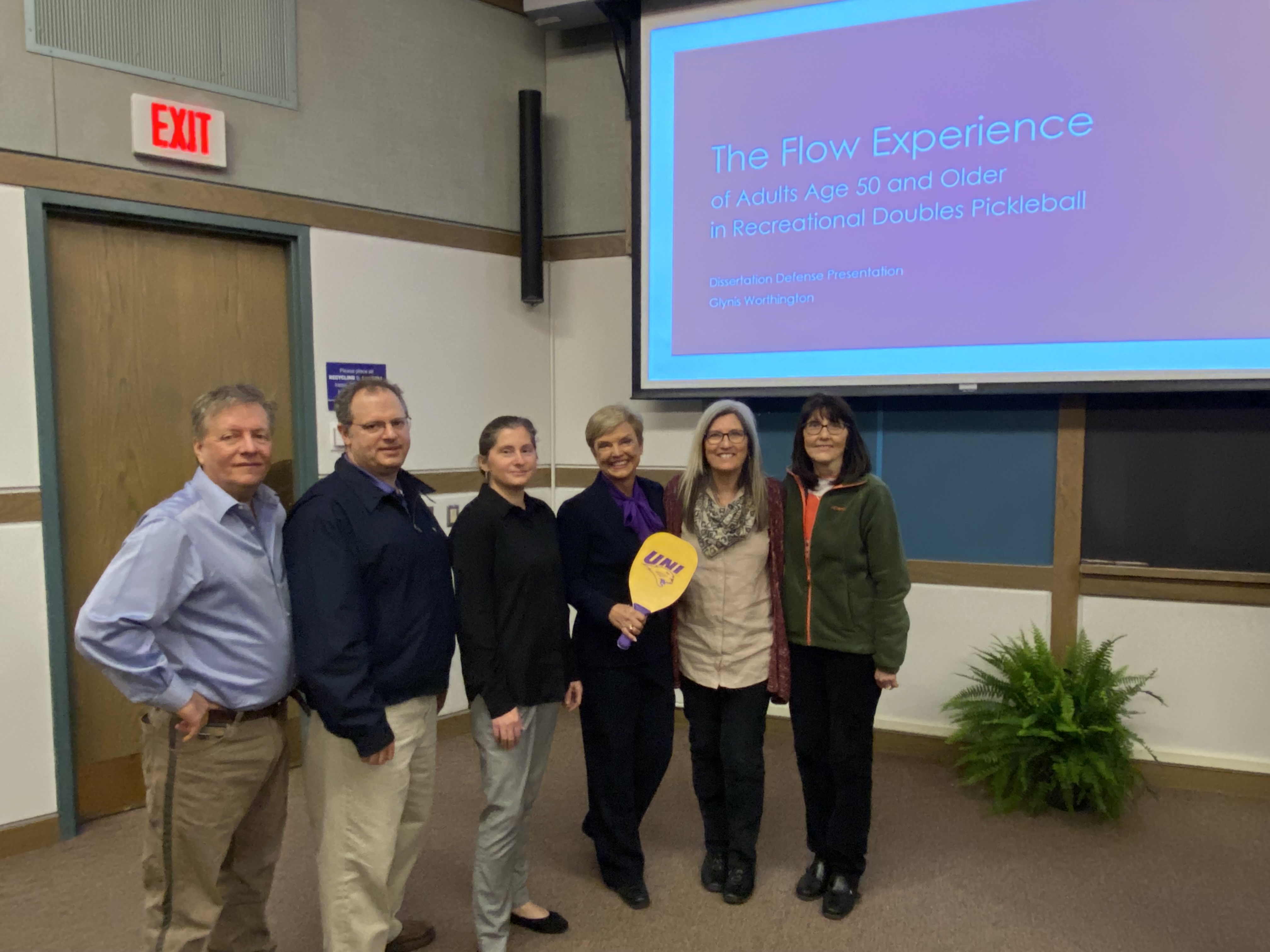At age 61, the study of pickleball led Glynis Worthington to earn her doctorate
At age 61, the study of pickleball led Glynis Worthington to earn her doctorate
Most people start planning for retirement when they’re 61 years old. But not Glynis Worthington. She’s thinking ahead to her next career and how she’ll utilize her new Doctor of Education from the University of Northern Iowa.
“I wouldn’t have it any other way,” she said. “I think going for the doctorate was my way to keep going with my story and not having life stop.”
Worthington has spent five years working toward her Doctor of Education in the Intensive Study Area of Allied Health, Recreation and Community Services. Like with any doctoral student, her dissertation has been the result of countless hours of hard work. The topic? The experience of adults ages 50 and older when playing pickleball doubles.
Worthington spent an entire year reading as much as she could about flow theory — when someone completely loses themselves in an activity. At first, she was skeptical of the idea, but it was the best way to account for the addictive nature of pickleball. After spending so much time researching, she became convinced. She’s now looking forward to finding more people to discuss flow theory with and sharing some of the new ideas she has.
“The idea that I was challenged to the point where I have confidence that I may be able to contribute to flow theory at the theoretical level says a lot about UNI and the people I learned from,” said Worthington.
For the most part, Worthington has stayed away from playing pickleball to keep her research objective. She estimates she’s observed more than 200 hours of people playing pickleball. Her study showed the pickleball players were experiencing higher levels of flow than have been previously recorded in professional studies.
Worthington dedicated her dissertation to her late father who she believes could have had a higher quality of life in his own retirement if he’d been participating in sports. She hopes the results of her study can have a positive impact on many.
“If we can help to push more people into active living and if that helps people be happier, that's what I hope this research does,” said Worthington. “I hope this encourages others to go out there and play, give it a try and see what happens.”
More than 50 people, including many pickleball players, showed up to Worthington’s dissertation defense to see the results of her study.
Long before she was diving deep into the world of pickleball, Worthington’s first career was in marketing after graduating from Iowa State University. While she was born and raised in Grinnell, Iowa, she and her husband, whom she married right out of college, moved around quite a bit. They lived and worked in 10 different states in the first decade they were married. Somewhere in the middle, Worthington earned her master’s in business with an emphasis in strategic planning from The Wharton School of the University of Pennsylvania.
Eventually, she decided to leave the workforce and stay home full-time with her four kids.
“I stayed home with the kids for over 20 years and then decided to get a doctorate to get back in the swing of things,” she said.
When her youngest child went to college, Worthington knew she was near retirement age but wanted to work. And rather than picking back up where she left off in her marketing career, she decided it was time for a change.
“So the question became: what do I want to do between age 60 and 80 as my work life?” Worthington explained. “Should it just be working for a company or is it doing things with a purpose?”
Worthington found some of that purpose in being active. At the time, she was training to compete in the Senior Games in track and field and approached a recreation center manager about helping a club of people over 50 who were also training for the games.
“I learned the only way to really start rec programs in communities is funding,” she said. “But people say you need science to prove the programs are good. So I said, ‘Fine, I’ll become the scientist.’”
It was Christopher Edginton, professor emeritus, who encouraged Worthington to not wait any longer to start the doctoral program.
“He really helped to inspire me and give me the confidence that I could do it — get the doctorate, and then in the process, I could contribute to the class,” she said.
After graduation, Worthington will be moving to Dallas. She is excited to be mere minutes from the location of the next pickleball nationals. She is also hoping to build connections with people at the Brain Institute, the University of Texas and Southern Methodist University to ultimately impact the area of sports participation among older adults.
While she is not exactly sure what her next career will look like yet, she’s thrilled with the decision she made to continue her education.






